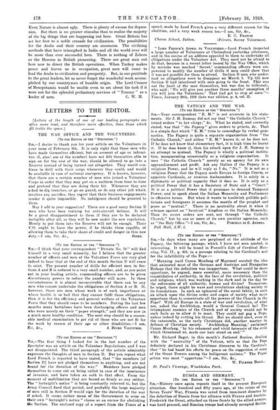(To THE EDITOR or THE " SPECTATOR.") Sni,—In days when
many are perplexed at the attitude of the Papacy, the following passage, which I have not seen quoted, is interesting. It will be found in Pureoll's Life of Cardinal Man- ning, Vol. II., p. 416, in a passage relating to the Cardinal's zeal for the infallibility of the Pope :- " Manning (said Canon Moufang of Mayence) scouted the idea that animated most of the German and Austrian and Hungarian Bishops that the definition was inopportune. What could be more opportune, he argued, more essential, more necessary than the consolidation of authority, in the face of the revolution, political and religious, which was working in the dark and in the day for the subversion of all authority, human and divine? Tomorrow, he urged, there might be wars and revolutions shaking society to its foundations. In such an -upheaval of the social fabric, in such an attack upon the divine order and organ of society what more opportune than to concentrate all the powers of the Church in the Pope? With all Europe in a state of war and revolution, of what use, asked the Archbishop, would a General Council be? The triumphant enemies of the Church and of society would, not be such fools as to allow it to meet. They could not gag a Pope, unless indeed by cutting his throat. But we should elect, even in the catacombs, as the early Christiana did, another martyr in defence of Christian society. Archbishop Manning,' exclaimed Canon Moufang, ' by his vehement and vivid forecasts of the evils which threatened us, made our hair stand on end."
Mr. Richard Bagot, in this month's National Review, dealing with the " neutrality " of the Vatican, tells us that the Pope definitely declared in his Christmas discourse to the Cardinals that " he had based his efforts for peace on the suggestion of some of the Great Powers among the belligerent nations." The Papal action was most " opportune."—I am, Sir, he.,
St. Paul's Vicarage, Wimbledon Park.
W. FALIENER BAILF.,


























 Previous page
Previous page